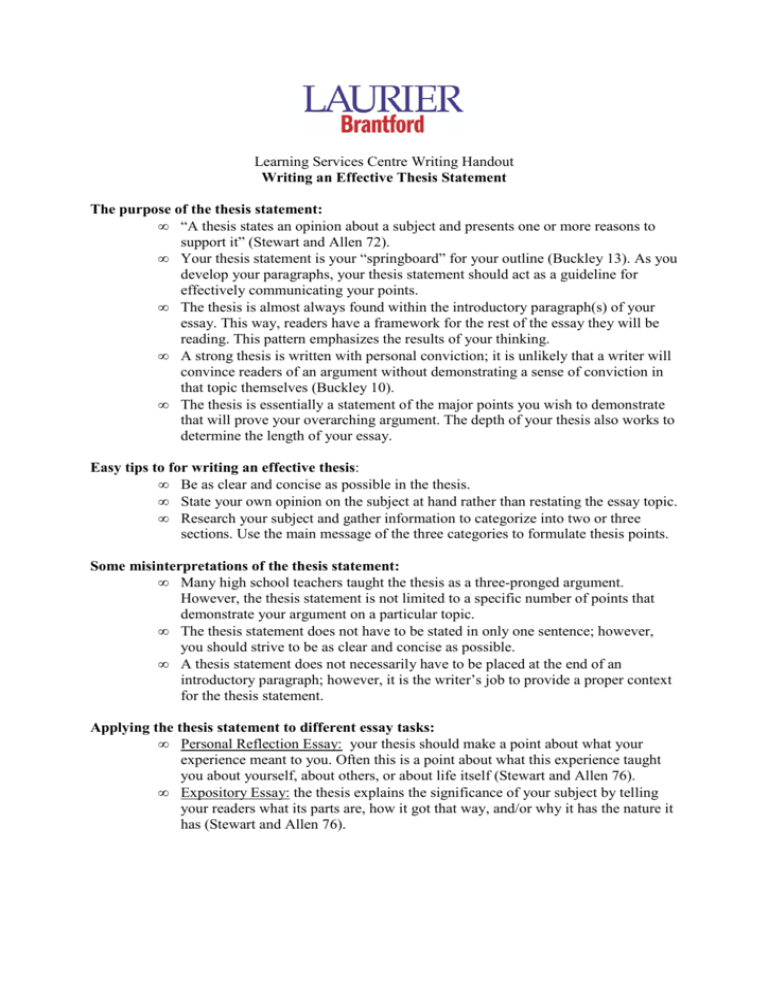
Learning Services Centre Writing Handout
Writing an Effective Thesis Statement
The purpose of the thesis statement:
• “A thesis states an opinion about a subject and presents one or more reasons to
support it” (Stewart and Allen 72).
• Your thesis statement is your “springboard” for your outline (Buckley 13). As you
develop your paragraphs, your thesis statement should act as a guideline for
effectively communicating your points.
• The thesis is almost always found within the introductory paragraph(s) of your
essay. This way, readers have a framework for the rest of the essay they will be
reading. This pattern emphasizes the results of your thinking.
• A strong thesis is written with personal conviction; it is unlikely that a writer will
convince readers of an argument without demonstrating a sense of conviction in
that topic themselves (Buckley 10).
• The thesis is essentially a statement of the major points you wish to demonstrate
that will prove your overarching argument. The depth of your thesis also works to
determine the length of your essay.
Easy tips to for writing an effective thesis:
• Be as clear and concise as possible in the thesis.
• State your own opinion on the subject at hand rather than restating the essay topic.
• Research your subject and gather information to categorize into two or three
sections. Use the main message of the three categories to formulate thesis points.
Some misinterpretations of the thesis statement:
• Many high school teachers taught the thesis as a three-pronged argument.
However, the thesis statement is not limited to a specific number of points that
demonstrate your argument on a particular topic.
• The thesis statement does not have to be stated in only one sentence; however,
you should strive to be as clear and concise as possible.
• A thesis statement does not necessarily have to be placed at the end of an
introductory paragraph; however, it is the writer’s job to provide a proper context
for the thesis statement.
Applying the thesis statement to different essay tasks:
• Personal Reflection Essay: your thesis should make a point about what your
experience meant to you. Often this is a point about what this experience taught
you about yourself, about others, or about life itself (Stewart and Allen 76).
• Expository Essay: the thesis explains the significance of your subject by telling
your readers what its parts are, how it got that way, and/or why it has the nature it
has (Stewart and Allen 76).
•
•
•
Persuasive Essay: a persuasive writer will explain in their thesis what the readers
should think or do and why. You reach your thesis by evaluating the strengths and
weaknesses of your subject. On most issues, readers are more likely to be
convinced by a thesis that offers a balanced perspective (Stewart and Allen 77).
Compare/Contrast Essay: the thesis should explain both the similarities and
differences in your subjects (Stewart and Allen 77).
Book Review/Critical Review: a thesis statement in this type of assignment will
encompass your opinions about that piece of writing, while simultaneously
providing supporting evidence for your claims.
Testing your thesis statement:
In order to create an effective thesis statement, the following questions should be adequately
answered:
1. Is the thesis specific to the material being analyzed and is it manageable for the length of
your paper? (Faigley, Graves and Graves 37)
2. Does the thesis successfully answer the “so what” question?
3. Is the thesis one-sided, or does it take into account all information that the writer has
come across? Moreover, after taking into account all of the detailed information, can the
thesis be adequately defended?
4. Is the thesis interesting to your intended audience? (Faigley, Graves and Graves 37)
Examples of good theses (Heffernan, Lincoln and Atwill 62):
Topic: The O.C
Generalization: The O.C was a quality program for all audiences to enjoy and was not merely a
silly drama.
Effective Thesis: The O.C. successfully depicted the friendships, responsibilities, and challenges
that inevitably develop for teenagers in an upper-class, high school setting.
Topic: The ban on pit bulls
Generalization: Not all pit bulls are cruel and vicious and the ban on them is unfair.
Effective Thesis: The ban on pit bulls is ineffective because it promotes cross-breeding,
stereotyping, and misinterpretations of docile pit bulls who pose no threat to human life.
Works Cited:
Buckley, Joanne. Fit to Print: The Canadian Student’s Guide to Essay Writing. Toronto:
Thomson Canada Limited, 2004.
Faigley, Lester, Roger Graves and Heather Graves. The Brief Penguin Handbook. Canadian
edition. Toronto: Pearson Longman, 2008.
Heffernan, James A.W., John E. Lincoln, and Janet Atwill. Writing: A College Handbook. New
York : W.W. Norton & Company, 2001.
Stewart, Kay L. and Marian E. Allen. Forms of Writing: A Brief Guide and Handbook. Third
Edition. Toronto: Prentice-Hall Canada Inc., 2006.
2007, 2011. For student use.





